TENOR CONCLAVE is essentially the story of four classic horn-men, all of them now representing something distinct in jazz history. Mobley is a fine example of just how deep the mainstream was in the years 1955-65, a guy whose discography is as substantial as any essentially straight ahead player from the era on any instrument, including trumpeter Donald Byrd. Like Byrd, Mobley’s best stuff was released by Blue Note, but he spread himself out all over the place, most notably Prestige, of which this session is just one part. He acquits himself in typically fine fashion. Al Cohn came out of Woody Herman’s band with fellow players Stan Getz, Serge Chaloff, and this recording’s Zoot Sims, but seems to have fallen into the shadow of all of his cohorts in that band with the exception of Chaloff. This might not seem like a big deal, but Cohn co-lead a major quintet with Sims in the second half on the 1950s that really brought home the bacon as far as post-bop from post-Hermanites was concerned. Sims just happened to be more prominent on recordings over a long period of time, the result being that his name and rep has grown over the decades, with Cohn developing into something approximating a player’s player. No matter. When he’s cooking, Cohn is as good (great) as Getz at his non-samba best. Or Sims, since he’s one of the blowers involved in this recording. Zoot has become a justifiably canonical player, forceful yet restrained, smooth but tough, swinging and smart. At the point of this record his sound was really the embodiment of a cross country road trip in a gas-guzzling convertible; large and powerful and engaging and stealthily cerebral. That leaves ‘Trane, and we know just how large an effect he had on the course of 20th Century music. But hell, here it’s early yet. We’re not even at BLUE TRAIN. Coltrane was at this moment a fiery young player that had understandably attracted the attention of Miles Davis. And on this date, he was just one amongst four in a group then named The Prestige All-Stars. Befitting that title, the rhythm section is appropriately solid: Red Garland on keys, Paul Chambers on bass and Art Taylor on drums. They lay down a foundation deep and warm for the four horn line, and the result is a quartet of tracks that possess a brilliance that is amplified by an inescapably offhand quality, a no-big-deal everyday greatness. All in a day’s work, you know?
Spending time listening to Coltrane can lead you into all sorts of unexpected areas, particularly in his early and late periods. One of the sweetest avenues a young John C traversed was recording with tubist Ray Draper’s Quintet. Now the tuba has surely never been the first (or fifth) horn people think of when modern jazz is the subject, but Draper’s group was anything but a novelty. It was a sincere and rather successful (in a lower case sense lacking in exclamation points) attempt to widen the sonic spectrum of post-bop. This is straight ahead jazz with an edge and an avant-garde approach not in the post-Coleman/Taylor sense, but rather in how directly it was engaged in opening up the instrumental sphere of a then commercially thriving medium. This record shares similar intent with Steve Lacy’s debut recording for Prestige SOPRANO SAX, since both featured instruments that were quite foreign to the modern jazz milieu of the period. Altos, tenors and trumpets ruled the roost, and while Lacy successfully cracked that supremacy to have a long career detailed in earnest elsewhere on this blog, Draper, to be frank, didn’t. And that’s a damn shame. For on NEW JAZZ 8228 the 17 year old tuba upstart sounds assured and passionate. While his axe of choice lacks the expressive range of Coltrane’s, Draper never falters by attempting to push matters. He colors, he comments, he accents, he leads. And when he solos, it is with the smarts and taste of a guy wise beyond his years. Like any in the pocket post-bop session of the era, this record rests on the total strength of the group’s ability, and the rhythm section stands tall even if their names aren’t those that normally fall off tongues engaged in ‘50s jazz-gab. Pianist Gil Coggins was an associate of Miles and Sonny Rollins, bassist Spanky DeBrest worked with Monk and drummer Larry Richie was an alumnus of Jackie McLean. All three are splendid on this record, and Coltrane is limber and focused in his role as the more emotive horn. Along the way, he trades moments with Draper and Coggins with sly tenacity, and then lays out on the album’s brief closing track, a piece well intended as a parting showcase for the record’s leader. Anybody who wants to get a true handle on just how wide ranging and rewardingly deep was the post-bop scene of the period should take a handful of listens to this baby. And then stick it in a stack of successive plays with TENOR CONCLAVE, the aforementioned Lacy disc, perhaps Rollins’ TENOR MADNESS (with the wonderful opening double team with Coltrane) and maybe Davis’ ROUND ABOUT MIDNIGHT. What I think you’ll hear is that NEW JAZZ 8228 is anything but an eccentric aside, an oddball one-off. It has a strong vital pulse of pure jazz invention, and it deserves to be something significantly larger than a footnote.



No comments:
Post a Comment